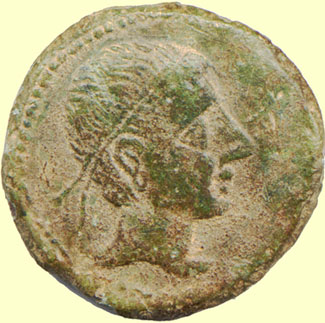 Contents -
Previous Article
Next Article
Contents -
Previous Article
Next Article
The Barbaricum
By Mike Lewis
Contributing Author
This column is concerned with the people outside of the Roman Empire, usually referred to as "barbarians". It was these barbarians who resisted the expansion of the Roman Empire and in time, destroyed it. It was these barbarians who became the modem nations of Europe and the Middle East. These barbarians were the people who became us.
The popular image of Rome is one of power and dignity. Spreading its advanced civilization and serving as an example of law to this very day. It seems unimaginable that any ancient people would resist Rome but they knew that Roman law was only for Romans and Roman civilization was merely the mask of a brutal and violent society. The fact is that most of Rome's neighbors did resist. Those that were not assimilated would destroy Rome.
The Romans were the great predators of the ancient world. Competition always resulted in war and to the Romans war could only end with the total submission or complete destruction of their enemies. In 146 BC Rome destroyed Carthage. 'Me surrektdered soldiers were killed, women, children and old men were murdered and even the animals were slaughtered in the fury of Roman blood lust.
In Europe, entire tribes of Gauls, Britons and Germans were killed or enslaved. The Gauls fought against Julius Caesar and destroyed the XII Legion and most of the V. Caesar counterattacked and the surrender of the Gallic city of Alesia netted the Romans 50,000 slaves with at least as many Gauls killed. The Gallic warlord Vercingetorix honorably surrendered to Caesar but was kept in chains for six years before being ritually strangled in the arena. Caesar boasted of killing five million Gauls, an act of unparalleled genocide.
In Briton the Iceni tribe, an ally of the Romans, was forced into rebellion by the crimes of the Roman governor. Tribal lands were seized and Britons enslaved. Boudicca, Queen of the Iceni was publicly whipped while her daughters were raped by Roman slaves. Queen Boudicca rallied the tribes and burned several Roman towns in addition to destroying a 2000 man detachment of the IX Legion. But eventually the Iceni were defeated and perhaps as many as 200,000 were massacred.
In. 66 AD the Romans placed their graven images in Jerusalem and looted the treasury of the Temple. The Judeans revolted and destroyed the Roman garrison. The Romans formed a new army and attacked. Jerusalem was burned and the Temple destroyed. A few "Zealots" held out at the desert fortress of Masada. The Romans laid siege tp Masada for several months before they completed an immense ramp to assault the fortress walls. Upon entering the fortress the legionaries found the defenders had killed themselves rather than be butchered or enslaved by the Romans.
But the Romans also suffered reverses at the hands of desperate people. In 9 AD the Germans united under the warlord Hermann and destroyed the XVII, XVIII and XIX legions in the Teutoburg Wald. The Parthians were especially successful in defending their independence and in 53 BC at Carrhae destroyed a Roman army of seven legions led by Crassus. In 378 AD the Goths, reduced to poverty by Roman law, revolted and destroyed an army of 40,000 including the Emperor Valens.
In time the subjected barbarians found a place within the empire. Gauls and Gennans served as auxiliary troops early on and by the time of Augustus, non-citizens accounted for 35 percent of the legions manpower. Legions left too long in the provinces became native. Even the emperors were no longer "Roman". Hadrian was Spanish, Constantine was Dalmatian and Magnus Maximus was perhaps a Briton! At the end Romano-Britons fought the Saxons, Romano-Gauls fought the Huns and Romano-Germans served as the emperor's guard. Many historians now think that King Arthur was a Romano-Briton warlord struggling to preserve the last comer of the old empire.
The barbarians, however, did not destroy Rome at its zenith. The barbarians may not have even been a threat had it not been for the endless civil wars. The Romans spent far more blood and gold fighting each other than in defending the empire.
In 476 AD Odovacer the Goth forced the abdication of the Emperor Romulus Augustulus. Odovacer wrote to the eastern emperor Zeno pledging vassalage and clearly stated that a new western emperor was not necessary or welcome. So began modem history.
In the future The Barbaricum will take a closer look at the barbarians (we barbarians), their cultures, conflict with the Romans, their victories and defeats. The column will be printed in English, a language that is Germanic in origin. As a closing footnote it is intriguing to realize that German, Celtic and Hebrew languages are still spoken today, Latin, however, is dead.
Go to next article:
Go back to previous article:
Return to Table of Contents